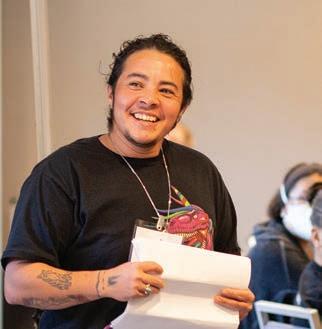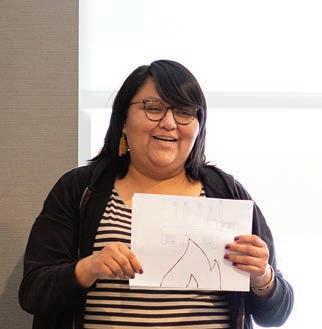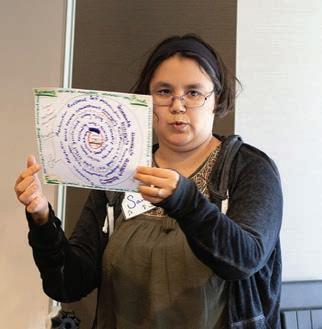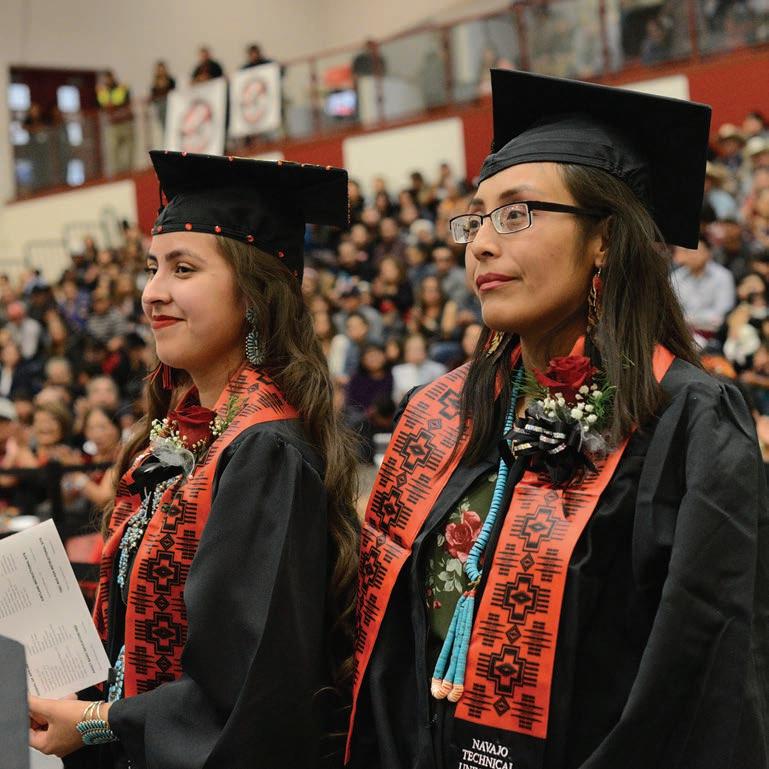ANNUAL REPORT 2021–22



THE CIRCLE CONTINUES

Our Mission
The American Indian College Fund invests in Native students and tribal college education to transform lives and communities.







The American Indian College Fund invests in Native students and tribal college education to transform lives and communities.


For 33 years, the American Indian College Fund has been committed to transparency and accountability while serving our students, tribal colleges, universities, and communities. We consistently receive top ratings from independent charity evaluators.

• We earned the Best in America Seal of Excellence from the Independent Charities of America. Of the one million charities operating in the United States, fewer than 2,000 organizations have been awarded this seal.

• The College Fund meets the Standards for Charity Accountability of the Better Business Bureau’s Wise Giving Alliance.

• The College Fund received a Gold Seal of Transparency from Guidestar.
• The College Fund consistently receives high ratings from Charity Navigator.

For more ratings and information, please visit https://collegefund.org/about-us/
74% Expenditures that are Scholarships, Programs, and Public Education
22% Expenditures that are Fundraising
4% Expenditures that are General Administration
Amove towards national acknowledgment and equity for Native people has been underway these past few years, putting Indian Country in the headlines more than ever. This is long overdue. For more than 500 years Native people have been ignored, rewritten, or deleted entirely from history. Stories about tuition waivers for Native students attending state higher education institutions; the implications of undercounting Native people in the U.S. Census; rectifying reporting procedures for murdered and missing Indigenous people; the U.S. Department of Interior’s investigation into Native children’s deaths in Indian boarding schools; and the political question about tribal sovereignty in Indian Country were in the headlines.
Simply put, Indian Country is both the land that is the United States (and indeed, all of the Americas). Indian Country is also a legal term describing tribal lands held in trust by the federal government for Native people who were and still are here.
Indian Tribes, bands, or other organized groups or communities, as well as Alaska Native villages, asserted their status as sovereign nations by negotiating treaties to exchange land with the federal government to access funding, goods, and services, and the education of our children. What we did not cede was our identities as sovereign Indigenous Nations: the right to uphold our beliefs, our traditions, our languages, our cultural practices, our connection to the land, and even the right to raise our children in our communities.
Although the history of treaty-making is fraught with duress, manipulation, and lies (running counter to the notion of good faith and fairness implicit in legal contracts), the treaties we signed as sovereign Nations with the federal government established trust relationships between the U.S. and Tribes. The Bureau of Indian Affairs, situated in the U.S. Department of Interior, upholds this trust relationship.

Tribal Nations remain sovereign to this day. It may be helpful to think of Tribal Nations in the United States as similar to member European countries in the European Union (E.U.). Citizens of Germany are subject to German laws and to the laws of the E.U., just as Tribal citizens are subject to Tribal laws and the laws of the United States. Each Tribal Nation has its own elected leaders, governments, and systems that continue to uphold tribal self-determination and self-governance.
Since the days of treaty-making, there have been deliberate attempts through federal legislation, policies, and social practices—such as boarding schools and child removal through the welfare system—that focused on breaking up the traditional, familial, and spiritual practices that are the foundation of our Tribal identities. The goal was assimilation and removal of Native peoples to take to our land. These efforts thankfully failed, but today they are underway again. The U.S. Supreme Court has already curtailed our status as sovereign nations this year in a case allowing states to prosecute non-tribal members committing crimes on sovereign Indian lands, and a pending case concerning tribal rights over its tribal members in adoption cases has Indigenous people deeply concerned about the future of sovereignty.
TCUs foster tribal identities and ways of living that reflect tribal selfdetermination. These institutions of higher learning are instruments of tribal sovereignty, having been chartered by Native Nations, and are a great source of healing and hope for more prosperous and healthier individuals and families in our communities. Since the establishment of tribal colleges and universities began during the Civil Rights Era, TCUs have reflected the values of the American Indian and Alaska Nations they serve. These remarkable institutions work to revitalize Indigenous languages, family systems, land, and natural resources—all important and fundamental to Native Nations’ sovereign status.
Now more than ever, your support—as allies, contributors, and advocates—is so important to our students, our TCUs, and our communities. We invite you to continue with us as we work to elevate the visibility of our histories, contributions, and existence as sovereign Nations.
Together, we can ensure a life of abundant opportunities for ourselves and for future generations of Indigenous people, while adding to the richness of this country—which is Indian Country.
Cheryl Crazy Bull President and CEO, American Indian College Fund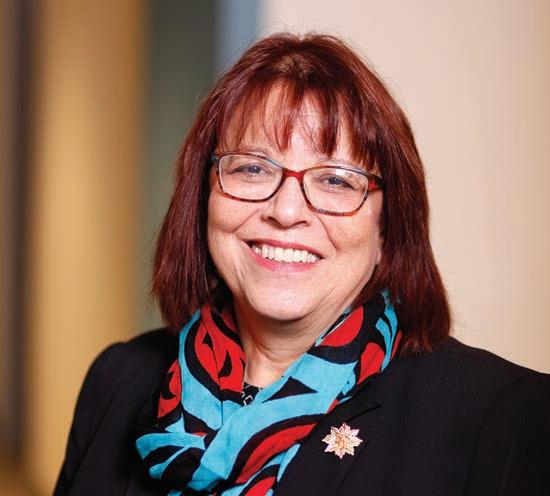
Total number of scholarships awarded since 1989: 153,890
Total number of students served since 1989: 128,700
Total dollar amount of scholarships awarded since 1989: $148,528,000
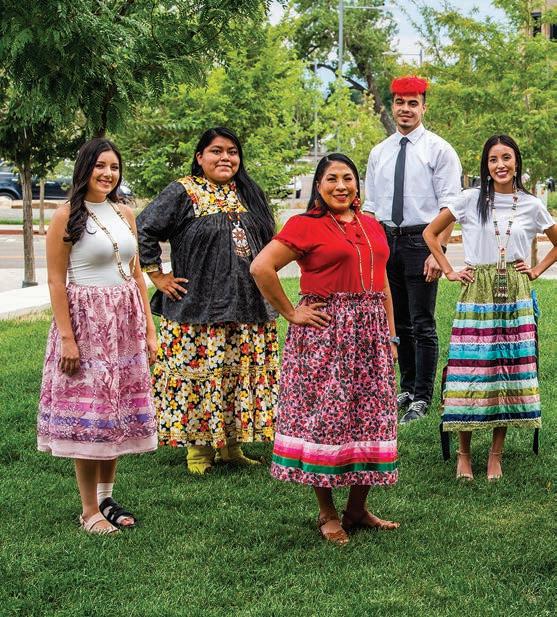
$
Total dollar amount of direct student support other than scholarships awarded since 1989: $9,974,000
$
Total dollar amount of all student support provided since 1989: $158,502,000
$
Total dollar amount of all student support awarded in 2021-22: $14,045,000
The American Indian College Fund has 258 unique scholarship programs
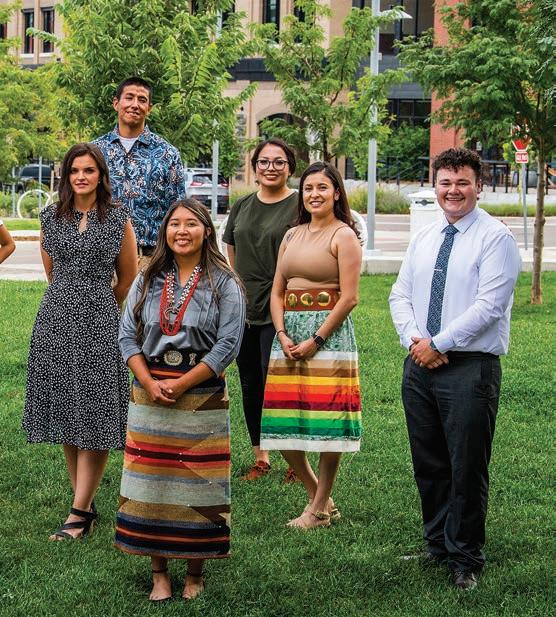
$
Total number of students served in 2021-22:
3,213 Total dollar amount of scholarships awarded in 2021-22: $13,125,000
Total dollar amount of direct student support other than scholarships awarded in 2021-22: $920,000
Number of first-generation scholars served in 2021-22:
1,892 or 58.9% of students
Top Five Majors of Our Scholars
Business Administration
Liberal Arts
General Studies
Early Childhood Education
American Indian/Native American Studies
In 2021-22, scholarship recipients attended tribal colleges and universities on 35 main campuses and 52 satellite campuses.
Alaska
1 Iḷisaġvik College, Barrow*
Arizona
2 Diné College, Tsaile*
2a Chinle
2b Crownpoint, New Mexico
2c Shiprock, New Mexico
2d Tuba City
2e Window Rock
3 Tohono O’odham Community College, Sells
3a Milepost 115.5, Sells
3b Milepost 125.5, Sells
3c Phoenix
3d San Carlos
Kansas
4 Haskell Indian Nations University, Lawrence*
Michigan
5 Bay Mills Community College, Brimley*
5a Petoskey
5b Sault Ste. Marie
6 Keweenaw Bay Ojibwa Community College, Baraga
6a L’Anse
7 Saginaw Chippewa Tribal College, Mount Pleasant
Minnesota
8 Fond du Lac Tribal & Community College, Cloquet
9 Leech Lake Tribal College, Cass Lake
10 Red Lake Nation College, Red Lake
11 White Earth Tribal and Community College, Mahnomen
Montana
12 Aaniiih Nakoda College, Harlem*
13 Blackfeet Community College, Browning*
14 Chief Dull Knife College, Lame Deer
15 Fort Peck Community College, Poplar
15a Wolf Point
16 Little Big Horn College, Crow Agency
17 Salish Kootenai College, Pablo**
17a Anchorage, Alaska
17b Wellpinit, Washington
18 Stone Child College, Box Elder*
Nebraska
19 Little Priest Tribal College, Winnebago
20 Nebraska Indian Community College, Macy
20a Pawnee, Oklahoma
20b Santee
20c South Sioux City
New Mexico
21 Institute of American Indian Arts, Santa Fe**
22 Navajo Technical University, Crownpoint**
22a Chinle, Arizona
22b Kirtland, New Mexico
22c Teec Nos Pos, Arizona
22d Zuni, Arizona
North Dakota
24 Cankdeska Cikana Community College, Ft. Totten
25 Nueta Hidatsa Sahnish College, New Town*
25a Mandaree
25b Parshall
25c Twin Buttes
25d White Shield
26 Sitting Bull College, Ft. Yates**
26a McLaughlin, South Dakota
26b Mobridge, South Dakota
27 Turtle Mountain Community College, Belcourt*
28 United Tribes Technical College, Bismarck*
Oklahoma
South Dakota
30 Oglala Lakota College, Kyle**
30a Allen
30b Batesland
30c Eagle Butte
30d Manderson
30e Martin
30f Oglala
30g Pine Ridge
30h Porcupine
30i Rapid City
30j Wanblee
31 Sinte Gleska, Antelope**
31a Lower Brule
31b Marty
32 Sisseton Wahpeton College, Sisseton
TCUs
TCU Satellite Campuses
Our scholars attended TCUs and mainstream colleges and universities in these states.
Washington
33 Northwest Indian College, Bellingham*
33a Auburn
33b Kingston
33c La Conner
33d Olympia
33e Tulalip
33f Lapwai, Idaho
Wisconsin
34 College of Menominee Nation, Keshena*
34a Green Bay
35 Lac Courte Oreilles Ojibwe College, Hawyward**
35a Hertel
35b Lac du Flambeau
23 Southwestern Indian Polytechnic Institute, Albuquerque *
29 College of the Muscogee Nation, Okmulgee
35c Odanah
35d Washburn
Sacramento City College
Sacramento State University
San Diego Mesa College
San Diego State University
San Francisco State University
San Joaquin Delta College
Santa Rosa Junior College
Sonoma State University
Stanford University
University of California - Berkeley
University of California - Irvine
University of California - Los Angeles
University of California - Merced
University of California - San Diego
University of California - Santa Cruz
University of Redlands
University of Southern California
West Hills College-Lemoore
William Jessup University
Colorado
Colorado Mesa University
Colorado School of Mines
Colorado State University - Ft. Collins
Fort Lewis College
Regis University
University of Colorado - Denver| Anschutz Medical Campus
Connecticut
Quinnipiac University
Yale University
Florida
Keiser University - Naples
Georgia
University of Georgia
Hawaii
University of Hawaii - Hilo
Idaho
The College of Idaho
University of Idaho
Illinois
Northwestern University - Chicago
Indiana
Purdue University Global
Kansas
Fort Hays State University
University of Kansas
University of Kansas Medical Center
Louisiana
Centenary College of Louisiana
St. Catherine University
University of Minnesota - Duluth
University of Minnesota - Morris
University of Minnesota - Twin Cities
Missouri
Missouri University of Science and Technology
University of Missouri - Kansas City
Montana
Montana State University - Billings
Montana State University - Bozeman
Montana State University - Northern
Rocky Mountain College
University of Montana - Missoula
University of Montana - Western
University of Providence
Nebraska
Nebraska Methodist College of Nursing and Allied Health
University of Nebraska - Lincoln
Wayne State College
Nevada
College of Southern Nevada -
Charleston Campus
Great Basin College
Truckee Meadows Community College
University of Nevada - Las Vegas
University of Nevada - Reno
Western Nevada College
New Hampshire
Dartmouth College
Plymouth State University
New Mexico
Central New Mexico Community College
New Mexico Highlands University
New Mexico Institute of Mining and Technology
New Mexico State University - Las Cruces
Northern New Mexico College
San Juan College
Southwestern College
University of New Mexico - Albuquerque
University of New Mexico-Gallup
Western New Mexico University
New York
Albany College of Pharmacy and Health Sciences
Long Island University
North Carolina
North Carolina State University
University of North Carolina at Chapel Hill
In 2021-2022, scholarship recipients attended 217 different mainstream institutions in 42 states.
Alabama
University of Alabama - Birmingham
Alaska
University of Alaska - Fairbanks
Arizona
A.T. Still University
Arizona State University
Grand Canyon University
Indian Bible College
Mesa Community College
Northern Arizona University
Pima Medical Institute
University of Arizona
Arkansas
University of Arkansas - Fayetteville
California
Butte College
California State University - Fresno
California State University - Fullerton
California State University - Long Beach
California State University - Los Angeles
California State University - San Marcos
California State University- Sacramento
California State University, Chico
Cerro Coso Community College
College of the Redwoods
El Camino College
Humboldt State University
Los Angeles Mission College
Mendocino College
Northcentral University
Orange Coast College
Otis College of Art and Design
Palomar Community College
Point Loma Nazarene University
Louisiana State University - Baton Rouge
Louisiana State University School of Medicine
Loyola University-New Orleans
Tulane University
University of Louisiana - Lafayette
Maine
Bowdoin College
Massachusetts Dean College
Harvard Law School
Wellesley College
Michigan
Central Michigan University
Eastern Michigan University
Lake Superior State University
Michigan State University
Northern Michigan University
Oakland University
University of Michigan - Ann Arbor
Minnesota
Bemidji State University
Bethel University
College of St. Scholastica
Minnesota State University - Mankato
Minnesota State University - Moorhead
Mitchell Hamline School of Law
North Dakota
Bismarck State College
Dakota College at Bottineau
Mayville State University
Minot State University
North Dakota State University
University of Mary
University of North Dakota
Valley City State University
Williston State College
Ohio
Franklin University
University of Akron
Oklahoma
Cameron University
East Central University
Indian Capital Technology Center -
Muskogee
Northeastern State University
Northwestern Oklahoma State University
Oklahoma Christian University
Oklahoma City Community College
Oklahoma City University
Oklahoma State University - Oklahoma City
Oklahoma State University - Okmulgee
Oklahoma State University - Stillwater
Oklahoma State University Tulsa
Rose State College
Seminole State College
Southeastern Oklahoma State University
Tulsa Community College
University of Central Oklahoma
University of Oklahoma
University of Tulsa
Oregon
Oregon Health and Science University
Oregon Institute of Technology
Oregon State University
Pacific University
Portland State University
Southern Oregon University
Southwestern Oregon Community College
Umpqua Community College
University of Oregon
Warner Pacific University
Willamette University
Pennsylvania
Drexel University
Rhode Island
Johnson & Wales University - Providence
South Carolina
Clemson University
South Dakota
Black Hills State University
Dakota State University
Presentation College
South Dakota State University
University of Sioux Falls
University of South Dakota
Tennessee
Middle Tennessee State University
University of Tennessee-Knoxville
Vanderbilt University
Texas
Colorado State University - Global
Rice University
Tarrant County College
Texas A&M Corpus Christi
Texas A&M University - College Station
Texas Christian University
Texas Tech University
Tyler Junior College
University of Houston
University of Mary Hardin-Baylor
University of North Texas
University of Texas at Austin
University of Texas of the Permian Basin
Utah
Brigham Young University-Provo
Dixie State University
University of Utah
Western Governors University
Virginia
Hollins University
Washington
Central Washington University
Gonzaga University
Spokane Community College
University of Washington - Seattle
Utah State University
Walla Walla University
Washington State University - Pullman
Washington State University - Spokane
Western Washington University
Yakima Valley Community College
West Virginia
Marshall University
Wisconsin
Lakeland University
Saint Norbert College
University of Wisconsin - Madison
University of Wisconsin - Milwaukee
University of Wisconsin - Stevens Point
University of Wisconsin - Stout
Studies show that young students who have a teacher from a shared racial, ethnic, or cultural background are more likely to believe they can succeed in the classroom and in professional careers.
For Native students, whose cultures, languages, and histories are often excluded from curricula, having a Native teacher is critical. Native teachers incorporate Native identity into lessons, including books, articles, and research by Native authors, and into projects that incorporate Native research and perspectives. Today less than one percent of teachers in the United States are American Indian/Alaska Native, according to the U.S. Department of Education. The problem is compounded by a lack of Native teachers serving in K-12 classrooms in rural areas and reservation-
based schools. Native teachers serve as role models, and the American Indian College Fund is working to develop a strong generation of Native teachers to nurture the talents and futures of Native children.

The College Fund’s approach to increasing the number of Native teachers in the classroom—from early childhood education to high school—is multipronged. It provides scholarships to individual students who are majoring in the education field and also funds teacher education programs at tribal colleges and universities (TCUs).
Participating TCUs: Ihduwiyayapi Advancing Indigenous Early Childhood Education
Blackfeet Community College
Browning, Montana
College of Menominee Nation
Green Bay, Wisconsin
Diné College
Tsaile, Arizona
Fond du Lac Tribal and Community College
Cloquet, Minnesota
Lac Courte Oreilles
Ojibwe College
Hayward, Wisconsin
Little Priest Tribal College
Winnebago, Nebraska
Navajo Technical University
Crownpoint, New Mexico
Northwest Indian College
Bellingham, Washington
Sitting Bull College
Ft. Yates, North Dakota
Southwestern Indian Polytechnic Institute
Albuquerque, New Mexico
Stone Child College
Box Elder, Montana.
Early childhood education promotes access to higher education by creating a foundation of success for students, leading to increased high school persistence, completion, and career readiness.
The College Fund launched its Ihduwiyayapi Advancing Indigenous Early Childhood Education (IECE) program to support Indigenous Early Childhood Education (IECE) programs at TCUs with the goal of building IECE capacity through teacher professional development.
Ihduwiyayapi is the Dakota translation for “they are getting ready.” Educators are preparing their institutions and programs to create an educational foundation for Native children starting in the early childhood years.
The IECE program is not the College Fund’s first foray into early childhood education. It builds upon the College Fund’s success since 2011 with creating innovative and culturally tailored early childhood programs which served more than 5,000 children, 3,900 families, and 2,700 teachers at TCUs across Indian Country. The IECE program is creating a community of practice, mentorship, and program development using Indigenous pedagogy, parent and family empowerment, and program alignment and articulation—all centered on Native values and education approaches while understanding education is critical to developing Native leaders.
Grants totaling $6.25 million funded the program from the Bezos Family Foundation ($5.3 million), the W.K. Kellogg Foundation ($600,000), the Heising-Simons Foundation ($350,000), and American Family Insurance ($30,000).
Launched with an inaugural cohort of six TCUs in 2021, today the program serves 11 TCUs that are working to create and enhance degree programs, support internship practicums, and increase their ability to support student recruitment, transfers, retention, and college completion.
These TCUs in turn empower parents and families to advocate for their children and themselves. TCUs also use storytelling to engage diverse audiences and connect their institutions to Native, community-based education expertise, while inspiring the next generation of Native educators. The program also established a community of practice for early childhood educators which is rooted in community knowledge to create and strengthen TCUs’ early childhood education pathways.
Wounspekiya Unspewicakiyapi, which translates to “teaching teachers,” is the American Indian College Fund’s new, two-and-a-half year, $2.25 million Native Teacher Education Program, funded by a grant from Margaret A. Cargill Philanthropies. The program goal is to work with selected TCUs to remove obstacles to students completing teacher education programs while providing them with the support to succeed during their college and education careers.
Program graduates will serve as teachers, community advocates, role models, and culture-keepers in their communities, while prioritizing a Native world view with their students.
The College Fund is working with TCUs to examine obstacles to completing teacher education programs and to provide support to build upon and amplify successful practices identified by the TCUs to increase student success.
Native students often do not pursue a teaching career due to poor perceptions about the profession, along with other systemic issues, such as lack of access to and awareness of postsecondary education pathways; the need for financial assistance for college; college readiness; career guidance; TCUs’ limited capacity to develop the next generation of teachers; and a lack of student teaching and college transfer opportunities to four-year degree and teaching certificate programs.
This project supports students interested in education careers, from college recruitment to students’ first and second academic years and on to teacher education programs, state certification, and employment.
The College Fund is working with TCUs to examine obstacles to completing teacher education programs and to provide support to build upon and amplify successful practices identified by the TCUs to increase student success.
TCUs with existing teacher education programs will participate in the project in the first program year. TCUs with emerging teacher education programs will receive small innovation grants in the second program year, with funding based on the established capacity of their teacher education programs.
The support of teachers, counselors, role models, and mentors helps students succeed on their path to college. Yet too often for Native students, that network of support is lacking.
Chandra (Hoopa Valley Tribal member/Hopi and Yurok), a College Fund scholar, student ambassador, and graduate of Northwest Indian College says, “We hear a lot of the time, ‘Go to school, get your education, come back to the reservation and make a difference.’” For Chandra, the message was clear, but the information and support about how to find scholarships, apply for housing, and manage finances was missing when she was in high school.
“Having the support for learning about some of those scenarios, especially scholarships, would have helped me be more successful when I was younger,” she says.
That is where the American Indian College Fund comes into play. In addition to scholarships, the College Fund offers programs to provide that information and support—and works with student ambassadors like Chandra to promote them.
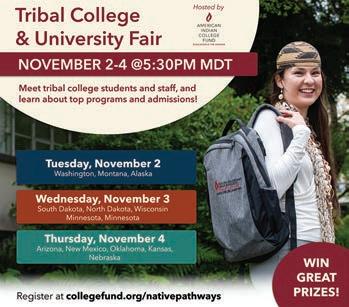

As it set out to offer students direct support through coaching, the College Fund’s High School College Choice program worked with Higher Pathways partners, which are reservation-based, Bureau of Indian Education, and near-reservation high schools. Students who participated in the program attended College Fund virtual events; worked on submitting FAFSA, scholarship and college applications; and worked with College Fund College Readiness coaches. Students also received text reminders and messages of encouragement as they continued their education journey. The program reached approximately 400 students from 55 partner schools.
This was a great start, but the College Fund wanted to help even more students across Indian Country. To do so, it shifted the program focus to support partner schools rather than individual students. The strategy worked. In 2021 the program supported approximately 4,000 students—a tenfold increase in the number of students like Chandra who are now on their way to achieving their dreams.
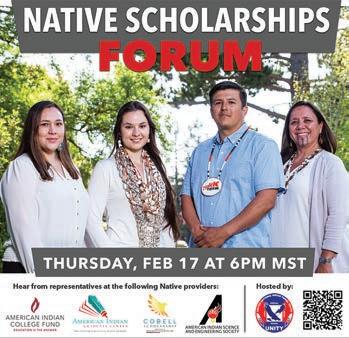
Because so many Native students are living in remote, rural areas—and many are not in the communities served by the High School College Choice program—the College Fund also reimagined its Native Pathways Summer of Success Conference. Launched as an in-person, two-day event reaching 30 high school students in 2019, the conference was converted to a virtual conference during the pandemic, reaching 150 students. Seeing the potential to reach more students with a virtual event, the 2021 and 2022 conferences continued online. Student sessions are culturally appropriate and include wellness and cultural identity, scholarship opportunities, how to write a college essay, financial literacy and completing the FAFSFA application, test-taking strategies, careers and majors, TCU information sessions, transitioning from high school to college, and more. Enrollment for the conference was nearly 500 in 2022, nearly 17 times the number of students reached.


The College Fund’s Student Ambassador Program is also vital to student outreach. Student ambassadors serve as role models for Native students through peer mentoring workshops and sessions at local high schools. Seeing other Natives who have successfully navigated to college, graduated, and entered careers gives up-and-coming Native students confidence—and the guidance—they need to achieve their own goals
College Fund Student Ambassadors like Chandra work with students in their communities, providing information on how to apply for College Fund scholarships and support programs. She says she is particularly keen to help students who are in danger of “falling through the cracks.”
Chandra says, “You never know who you are inspiring just by doing what you need to do. And especially when you can come back to your reservation and teach people… ‘Hey, this is what worked for me. And this is what I did, and these are the scholarships I got. This is what you should apply for.’ I think that is huge.”

“ You never know who you are inspiring just by doing what you need to do. And especially when you can come back to your reservation and teach people…” – Chandra
With her eyes on the sky as she reaches for an aerospace career, Nylana (Navajo Nation) has worked as a NASA student intern in various capacities since 2019.

Working at NASA’s Lyndon B. Johnson Space Center (JSC) in Houston for three months in 2019, Nylana served in the JSC’s Crew and Thermal Systems Division to audit hardware and components that support aerospace life support systems, including the Portable Life Support System. This system helps create a livable atmosphere inside spacesuits, and allows astronauts to make lunar and space excursions.
During that first internship, Nylana celebrated the 50th anniversary of the Apollo 11 lunar mission. A highlight was meeting astronaut Suni Williams, the ninth woman to walk in space. She also met Aaron Yazzie, a mechanical engineer at NASA’s Jet Propulsion Laboratory, and Seth Begay, a NASA computer engineer, both from the Navajo Nation. She credits Yazzie and Begay with motivating her further, while her internships helped her build a foundation for success in the aerospace industry.
In 2021 Nylana headed to the space agency’s Marshall Space Flight Center (MSFC) in Hunstville, Alabama for 15 months, where she worked as an intern in its additive manufacturing research lab. She was invited back to MSFC for a fall 2022 internship, where she is working closely with larger scaled Direct Energy Deposition (DED) metal printing. She says her objective is to learn more of NASA’s additive manufacturing techniques to apply back at Navajo Technical University on her home reservation, where she is studying mechanical engineering with a concentration in additive manufacturing. Her long-term goal is a career in high-concentration aerospace additive manufacturing, which allows for stronger and more efficient components, faster lead times, and lighter weight parts critical for aerospace.
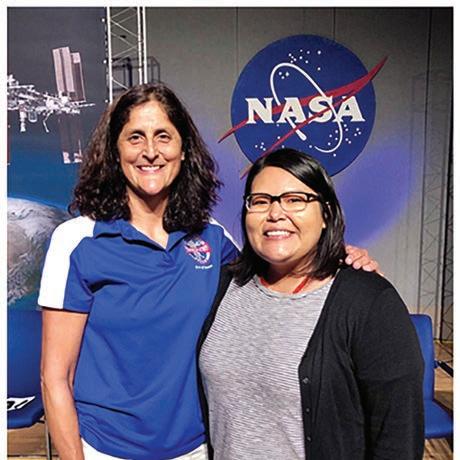
While hands-on technical experience working on a NASA team are invaluable to her career aspirations, Nylana is also grounded in her education, community, and culture. She has held student leadership positions at NTU and serves as an American Indian College Fund student ambassador.
Nylana’s passion for aerospace and her love for technology, engineering, and the Native community have not gone unnoticed by the media. She has been interviewed about her dream to serve on a team at NASA or Space X and her desire to show Native students that there is a world of opportunity waiting for them.
Using her platform as a College Fund Student Ambassador and scholar to share her experiences with other Native students, Nylana demonstrates how scholarships, a college education, and internships connect to serve
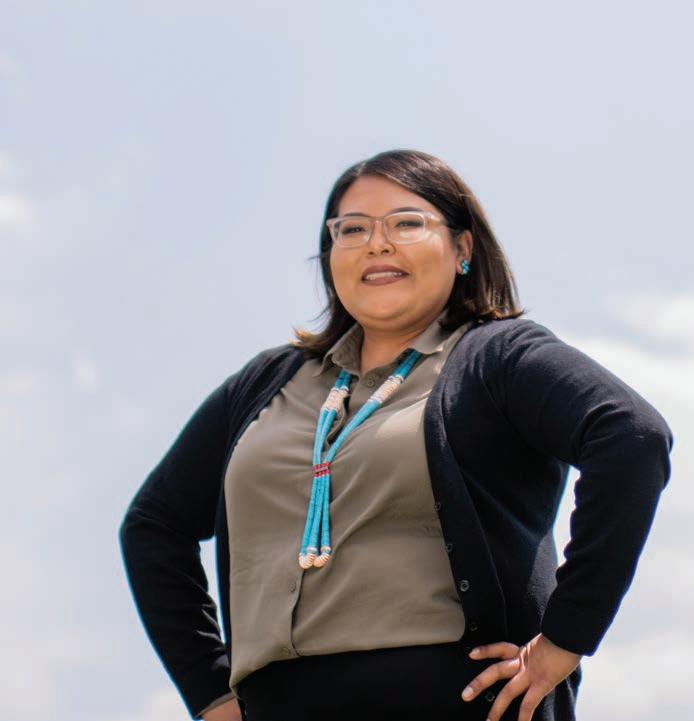
as the rocket fuel that makes dreams a reality. Nylana is particularly keen to encourage students to pursue studies in STEM (science, technology, engineering, and math) fields, where Native people are often underrepresented.
She credits the American Indian College Fund TCU and Full Circle Scholarships for lightening her financial burden, allowing her to focus her energy on learning.
“Your generosity inspired me to help others and give back to the community. I hope one day I will be able to help students achieve their goals just as you have helped me,” Nylana says.
“ Your generosity inspired me to help others and give back to the community.
I hope one day I will be able to help students achieve their goals just as you have helped me.”
Native American people, cultures, and perspectives are still not seen or heard by most Americans. To increase awareness of, and conversations with, Indigenous people about issues impacting Native communities, the American Indian College Fund launched its “This Is Indian Country” Campaign. The campaign, which includes several PSAs, is a collaboration with long-time advertising partner Wieden+Kennedy.
Indigenous histories have been largely ignored, rewritten, or deleted entirely from history for 400 years. “This Is Indian Country” works to educate and engage people in the acknowledgement and recognition of Indigenous people nationwide, sharing our nation’s truthful history.
Cheryl Crazy Bull, President and CEO of the American Indian College Fund, said, “For the narrative of American history to be inclusive and for Indigenous people to have equity in all areas of American life, our neighbors must know that we are here and acknowledge that there is work to be done to build a better and more equal society. The ‘This Is Indian Country’ campaign is intended to be an entry point for all people to build greater understanding across the United States. Through this entry point, all people can learn about the rich, diverse cultures of the original people
of what is now the United States, and all people can take action to create a more just society. We can be united in our quest for abundance in our lives for ourselves and for future generations. We believe in education, both for the knowledge that education provides and for the opportunity it presents. We invite all learners to join us in this quest.”
The campaign soft-launched in October 2021 with a full-page public service announcement in The New York Times print edition on Indigenous Peoples’ Day. The full campaign, including television ads, a series of films, social media, print, and out-of-home public service announcements and a website debuted for Native American Heritage Month in November.
The campaign also includes several videos that reclaim the term “Indian Country,” an official legal term noted in numerous Supreme Court opinions and referenced of federal law, including treaties, policies, and laws that ordered Indigenous assimilation and erasure. Yet, more than a legal phrase, Indian Country is the phrase Native people use on reservations and in the stories Native people tell. This term may have been used against Native people, but it has been reclaimed and the PSA campaign seeks to continue that reclamation to continue to build community and empower Indigenous people.
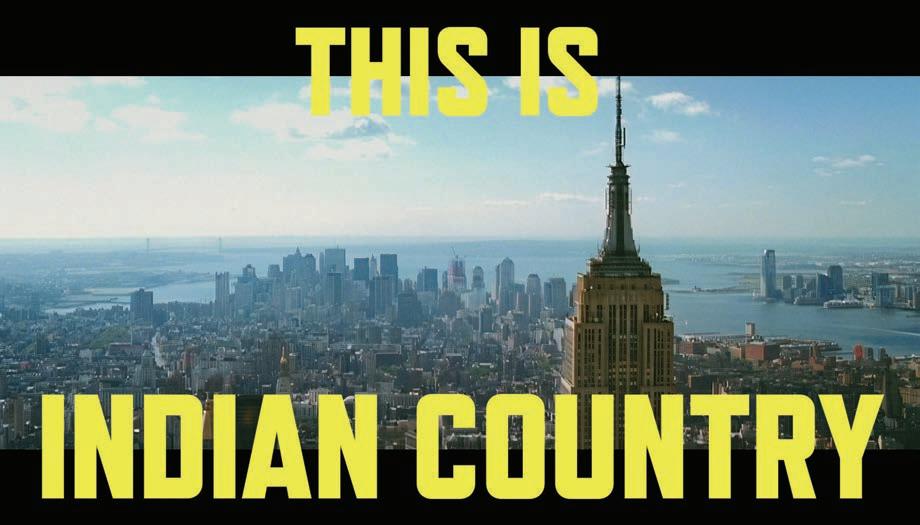
Over the decades working with the College Fund, Wieden+Kennedy has leveraged its relationships with its media partners and legendary artists to produce sophisticated, cutting-edge advertising on a pro-bono budget, and “This Is Indian Country” was no different. Joe Pytka, who has played a pivotal role in the College Fund’s advertising campaigns for several decades, was tapped to serve as the television and film director for “This is Indian Country.” In addition, the campaign’s film “Democracy, Indian Country” was co-directed by Indigenous filmmaker Robin Máxkii (Mohican), a Wieden+Kennedy copywriter who is a former College Fund scholar, tribal college graduate, and College Fund student ambassador.
Individuals and organizations can support the movement for Indigenous recognition, representation, and equity by using resources and materials available at ThisIsIndianCountry.com. The site includes student stories, suggested ways to support the College Fund through donations and events, resources for creating land acknowledgements, and downloadable materials.
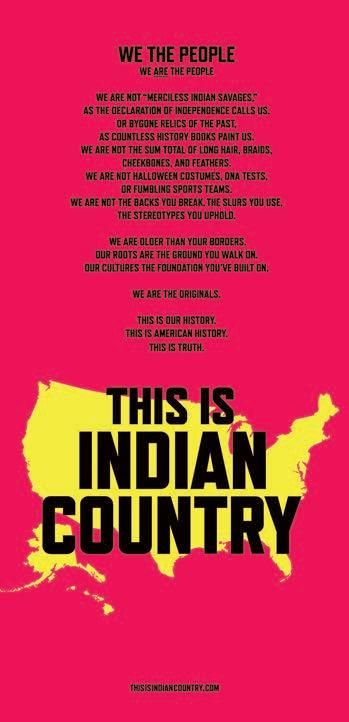
In 2022, the campaign has continued to build upon the success of the launch to feature a specific call to action to recognize, include, acknowledge, and celebrate Indigenous People every day of the year with the digital campaign #IndigenousEveryDay.
Media outlets and organizations interested in running the print and video public service announcements can contact the American Indian College Fund at 303-426-8900 or NHouk@collegefund.org.

David Kennedy loved to tell the story of how the American Indian College Fund became a Wieden+Kennedy client. Each time he told it, his eyes lit up as if he were experiencing it for the first time.

As Kennedy recalled, “It all began on December 19, 1990. I received a letter from Barbara Bratone, the executive director of the American Indian College Fund at the time, who was wondering if Wieden+Kennedy would be interested in taking on the College Fund as a pro bono client. I ran screaming down the hall to [Dan] Wieden’s office, waving the paper, and saying, ‘Look at this!’ We met with the College Fund that spring and we’ve been doing their advertising ever since.”
Kennedy was an art director when he co-founded Wieden+Kennedy in 1982 with his copywriting partner Dan Wieden. They quit their thencurrent advertising jobs at William Cain, took a small shoe company named Nike with them as a client, and the rest is history. Together they created some of the most iconic and culturally relevant work in advertising, including Nike’s tagline “Just Do It.”
Fast-forward to today, 40 years later, and Wieden+Kennedy has expanded to eight global offices and remains a creatively led, independent advertising agency where “people come to do the best work of their lives.”
Kennedy retired in 1993, three years after the partnership with the College Fund began. But that did not stop him from coming into the office almost every day and dedicating himself to the College Fund’s work as a creative director.
He was a thoughtful, compassionate, and humble leader. An incredible illustrator, letterer, and craftsman, Kennedy would spend his time in the agency’s design studio with his ruler and X-ACTO® blade, piecing together a layout or sketching an idea. He always wore the same ensemble: Levi’s® jeans, a black T-shirt, and suede cowboy boots. He was a worker.
As the late Dan Wieden recalled, “When David comes to work and picks up the challenges of working on the American Indian College Fund, he’s going to church. This is a very, very deep, emotional [and] spiritual relationship David has with this organization that springs from his love of his early relationships in Oklahoma. He feels a deep kinship with Native peoples.”
During a partnership with the College Fund that has lasted over 30 years, Kennedy never really retired. He created more than a dozen advertising campaigns for the College Fund, the first in 1991. It was a single-page print ad with a bold headline: “A Sane, Rational Argument for Giving the Entire Country Back to the Indians.”
Later that year the College Fund released the first Wieden+Kennedycreated television campaign, “Save a Culture That Could Save Ours.”
Kennedy enlisted his long-time friend, director Joe Pytka, with whom he had worked with on several iconic Nike spots. Over the years Pytka continued to be a valuable partner, directing multiple television campaigns for the College Fund. David believed that Wieden+Kennedy has relationships with some of the best talent in the industry (directors, photographers, illustrators, designers, writers, musicians), and there would be a “hot place in hell for us if we didn’t take advantage” of them to give back to Indigenous people.
Other Wieden+Kennedy campaigns created for the College Fund included “Why Did You Go to College” (1998), “Educating the Mind and Spirit” (1999), “Have You Ever Seen a Real Indian?” (2002), “If I Stay on the Rez” (2005), “Think Indian” (2009), “Help a Student Help a Tribe” (2012), “One Percent” (2017), and “Path” (2019).
“This Is Indian Country,” the latest work Wieden+Kennedy and the College Fund worked on together, was launched on Indigenous Peoples Day in 2021, the day after Kennedy passed away. Kennedy was so excited about the campaign and said it was a culmination of decades of work that led up to this moment. He loved the powerful, unapologetic, and provocative statement. He loved the bold type that is hard to deny. And he was excited to finally get to the heart of the matter.
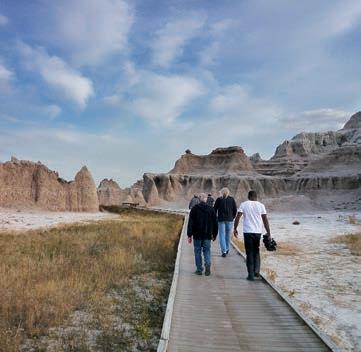
Last year’s launch of “This Is Indian Country” was just the beginning of a multiyear endeavor to acknowledge a historically erased group of Americans. The campaign is designed to increase awareness of and
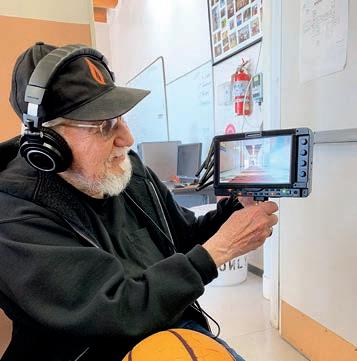
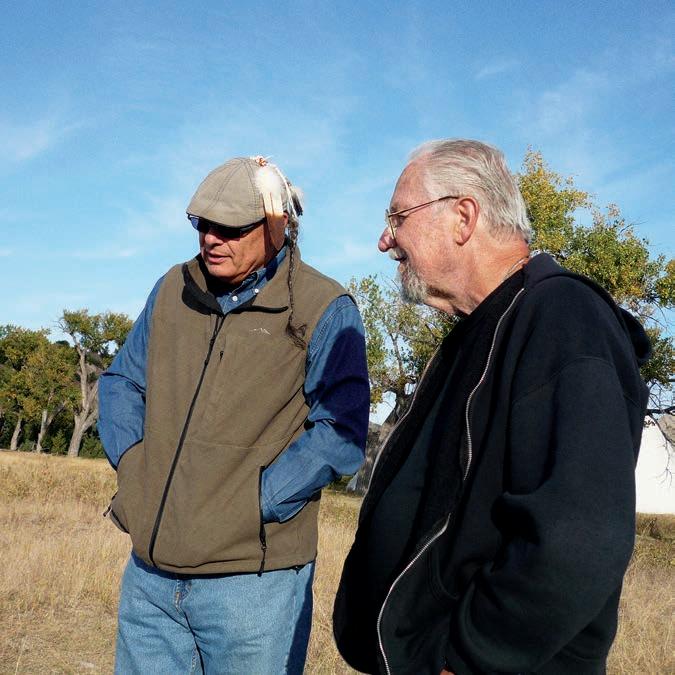
conversations about Indigenous people and issues at a time when Native people are still not seen or heard by most Americans. Its goal is to remind people that Indigenous culture is American culture.
Kennedy left behind an unrivaled legacy that shaped advertising and changed and inspired so many lives, but it was his College Fund work that he said made him the proudest.
“I think that my career in advertising means nothing if I can’t do something good with it,” Kennedy said.
“ When David comes to work and pick s up the challenges of working on the American Indian College Fund, he’s going to church. This is a very, very deep, emotional [and] spiritual relationship David has with this organization…”
Chair:
Leander “Russ” McDonald
President, United Tribes Technical College
Member-At-Large:
First Vice Chair: Cynthia Lindquist President, Cankdeska Cikana Community College
Michael Purvis Managing Director, The Blackstone Group
Second Vice Chair: Sandra Boham
President, Salish Kootenai College
Resource Development Chair: Brenda Toineeta Pipestem Of Counsel, Pipestem & Nagle Law
Twyla Baker
President, Nueta Hidatsa Sahnish College
Tom Brooks Vice President-External Affairs, AT&T External Affairs
Haven Gourneau
President, Fort Peck Community College
Justin Guillory
President, Northwest Indian College
Dawson Her Many Horses
Senior Vice President, Wells Fargo Middle Market Banking
Board of Trustees:
Dan King
President, Red Lake Nation College
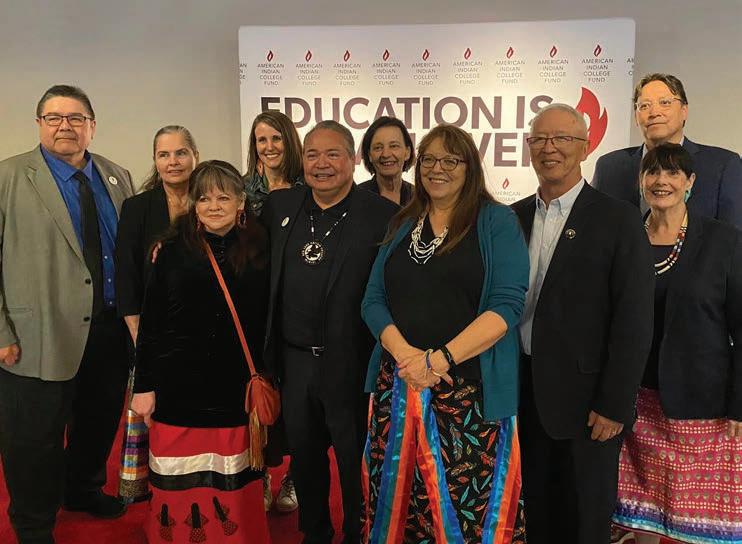
Stefanie Miller President, Kellogg’s Away From Home
Michael Oltrogge
President, Nebraska Indian Community College
Lynn Dee Rapp
President, Eagle Opportunity
Charles “Monty” Roessel President, Diné College
Carla Sineway
President, Saginaw Chippewa Tribal College
Angela “Denine” Torr
Executive Director, Dollar General Literacy Foundation, Dollar General Corporation
Meredi Vaughan CEO, Vladimir Jones
Dennis Worden Director, Walmart, Inc.
David E. Yarlott, Jr. President, Little Big Horn College
The following generous supporters have left lasting legacies through their estate plans. Their generosity ensures that American Indian and Alaska Native students will have the opportunity to pursue their dreams of a higher education and a career. We honor their memories here.
Anonymous
Helen T.M. Bayer
Betty Irene Boardman
Lillian C. Brilhart
Larry Claude Burgoon
Kristin R. Carlson
Margaret Carson
Joan W. Cho
JoAnn Corey
Marilyn Creason
Susan J. Darsh
Robert Donner
Robert E. Evans
William Fessler
Morris Finley
Maureen R. Frechette
Ruth Galaid
Martin Gardner
Dennis H. Gray
Jane Elizabeth Griffin
David J. Hamilton
Phyllis Hanicke
Robert K. Haning
Virginia E. Jarvis
Robert H. Kaeppel
Robert B. Keiser
Barbara M. Kent
Jacqueline Kienzle
Barbara S. Kinsey
Katherine A. Levin
Salvatore Patrick Lucchese
Willard Matteson
Jacqueline S. Mithun
Robert L. and Jeannette Munkres Trust
Vincent G. Murphy
Edison J. Nunez Jr.
Kathryn O’Keeffe
Irene Rita Pierce
Bernie M. Porter
Mildred Potucek
Patricia A. Rambo
Carla Remondini
Janice Marie Richardson
Stoyell M. Robbins
H. Geraldine Rogers
Joel Rothberg
Roberta S. Salyer
Hannelore M. Schulz
Sharon R. Scott
Douglas S. Stewart
Margaret A. Walters
Sallie Wesaw
Eddie C. Zawacki
The following generous individuals, corporations, and foundations have helped support Native higher education through their gifts to the American Indian College Fund.
$100,000+
The Andrew W. Mellon Foundation H
Bank of America Charitable Gift Fund
Anonymous H
Arizona Public Service
AT&T Foundation H
Bank of America Charitable Foundation, Inc
Bezos Family Foundation H
Chan Zuckerberg Initiative
The Chicago Community Foundation
Cleveland Guardians Baseball Company, Inc.
Coca-Cola Foundation
Comic Relief Inc.
Costco Wholesale
Dollar General Literacy Foundation
The Earl and Anna Broady Foundation
FedEx Corporation
Fidelity Charitable Gift Fund
Heising-Simons Foundation
The Henry Luce Foundation, Inc. H
John D. and Catherine T. MacArthur Foundation
Katharine Scallan Scholarship Trust
Amy Kaufman
L.L. Foundation for Youth
Margaret A. Cargill Philanthropies H
National Philanthropic Trust
Native American Agriculture Fund
Nike, Inc.
OJ and Mary Christine Harvey Educational Foundation H
PayPal Giving Fund
Rowena Pecchenino
Pechanga Band of Luiseno Indians H
The Peierls Foundation, Inc.
Pendleton Woolen Mills
Katharine A. Powell
Raymond James Charitable Endowment Fund
Reboot Representation
James and Kate Rogers
Schwab Charitable Fund
Dr. Michelle P. Scott
Solon E. Summerfield Foundation, Inc.
The Spencer Foundation H
Jennifer Stengaard Gross and Peter Stengaard
Strada Education Network H
Synchrony
Target Corporation
Tides Foundation
Tribal Alliance Partners
United Health Foundation H
Vanguard Charitable Endowment Program
W. K. Kellogg Foundation H
Walmart Foundation
The Walt Disney Company
The Weissman Family Foundation, Inc.
Wieden+Kennedy
The Wilke Family Foundation H
$50,000 – $99,999
1st Tribal Lending
Adam and Rachel Albright
Alvin I. & Peggy S. Brown Family Charitable Foundation
Anonymous (2) H
Anonymous Foundation
Administered By Edward G. McAnaney
Mrs. June E. Beaver
Kimberly S. Blanchard
The Boeing Company
Joseph and Teresa Canfora
Judith B. Carmichael
Charter Communications, Inc.
Clayton and Odessa Lang Ofstad Foundation
Ford Foundation
H. Geraldine Rogers Trust
Ms. Audrey Heneage
Indian Motorcycle
JCDRP Family Foundation
JPMorgan Chase Foundation
Kenneth L. Conca
Mr. George Stabler Loening
Kathleen Mary McMahon
The Kathryn B. McQuade Foundation H
Mickey and Nancy Michel
Morgan Stanley Gift Fund
The National Native American Boarding School Healing Coalition
Paul M. Angell Family Foundation
Ralph Lauren Corporation
Renaissance Charitable Foundation, Inc
Robert L and Jeannette Munkres Trust
The Roni Horn Foundation
Scruggs Memorial Fund
Silicon Valley Community Foundation
Walter and Ursula Eberspacher Foundation
$25,000 – $49,999
ABLC Oper CFC
Adolph Coors Foundation
Dr. Richard J. Almond
American Endowment Foundation
Amherst College
Anonymous H
Argosy Foundation
The Armstrong Foundation
Aspen Community Foundation
Association on American Indian Affairs
Jo Anne B. Balling
Richard J. Barber
Rosamond J. Campbell
Central Indiana Community Foundation
Mr. James Clubb
Community First Foundation
Community Foundation for Northeast Florida
Joan E. Corey
Doris Antun Revocable Trust
Entergy Corporation
Ellen L. Ferguson
Ms. Elizabeth A. Fray
Michelle D. Fuller
Give Lively Foundation Inc.
Grace S. Shaw-Kennedy Foundation
Grace Adolphsen Brame Trust
A star (H) by the donor’s name indicates this donor has created a pathway to Native student success through a multi-year commitment.
A flame ( ) by the donor’s name indicates this donor is a confirmed member of our Circle of Vision Society and has included the American Indian College Fund in their estate plans.
Guidewire Software Services
Joel and Helena Hiltner
Harold L. Horstmann
Hugh and Jane Ferguson Foundation
Inter-Tribal Council of AT&T Employees
Irene Rita Pierce Charitable Lead Annuity Trust
Joseph and Sophia Abeles Foundation, Inc.
Marjorie L. Keely
L. P. Brown Foundation
Macy’s
Dr. Richard Lee Meehan, D.D.S.
MGM Resorts International
Bette Midler and Martin von Haselberg
Anonymous
Northern Trust Company
PayPal Giving Fund
Penguin Random House
Ms. Gretchen Pfuetze
Monique Regard and Frederick Duffy
David and Jill Rogers
Rosalie J. Coe Weir Foundation
Marjory H. Russell
Jack and Lindsey Sayers
John and Maria Schell
Mareke Schiller
Anne C. Sigleo M.D.
Mary Ellen Smith and Nancy Hannah
Mr. David Terribile
George J. Then
TikTok Inc.
Toyota Motor North America US Bank
The VF Foundation
Virginia W. Hill Charitable Foundation
Michael A. Wall
Glenn H. Weder
Philip O. Wheatley
Luke Whitesell and Catherine McLellan
$10,000 – $24,999
AMB Foundation
Amergent
The American Gift Fund
American Family Insurance
Mr. Paul Anders
Ann and Gordon Getty Foundation
Anonymous (8) H
Mr. Michael Apgar
Arch Capital Services LLC
Kristin K. Armstrong
Astis
AT&T Employee Giving Matching Campaign
Shane and Bonnie Balkowitsch
Nadine P. Bartsch
Dianne M. Batzkall
Janet R. Bean
Michelle and Richard Bellows
Ben Plucknett Charitable Trust
Henry and Rhoda Bernstein
Mary S. Bilder
Eleonor Bindman and Eli Gottesdiener
David and Elsa Blanton
Susan and James Bondarenko
Roger M. Boone
Suzanne Born
Brad Lemons Foundation
Brokaw Family Foundation
The Bulova Stetson Fund
Rev. Martin L. Buote
Nola and Neil Burkhard
Richard and Elizabeth Burns
Susan O. Bush
Thomas and Carol Butler
Ann S. Buxbaum
Katherine Cameron and Richard Vaccaro
James and Kathy Cargill
Carol C. Johnson Charitable Foundation
Central New York Community Foundation, Inc
Ann Clark and Charles Kirkpatrick
Lisa Cohen and Hershel Kleinberg
Lowell T. Cook
The Cosmopolitan of Las Vegas
Keith Cowan and Linda Walsh
Kristine B. Crandall
Darby Foundation
The Defense Against Thought Control Foundation, Inc.
Lindy Delf and Anthony Wolk
Dennis and Phyllis Washington Foundation
Nicoletti and Bruna DePaul
Julia DeVlieg
Diana E. Dundore
James R. Dunn
Bernadine J. Duran
Edward & Verna Gerbic Family Foundation
El Pomar Foundation H
Sigrid Elenga and C. Stephen Smyth
Enerplus
Ernst & Young Foundation Matching Gifts Program
ExxonMobil Matching Gift Program
Michael G. Feiss and Cathy Cole
Fenwick Community Fund
David Fitzpatrick
Martin and Judith Freedland
Sandra and R. Neil Fuller
John and Carole Garand
Aaron T. Garnett
Gikinoo’amaage Indigenous Educators Coalition
Goldman Sachs Philanthropy Fund
Google Matching Gifts Program
Jean and James Hall
James L. Hamilton
Lucile Hamlin
William F. Harrison
Helen Roberti Charitable Trust
Ms. Mary H. Hodge
James and Susan Hofman
Houston Jewish Community Foundation
Houston Family Foundation
Barry W. Hubbard
Terrill Hyde
Impact Assets
Intel Foundation
Isa-Maria and David Shoolman Family Foundation
Philip D. Jackson
Stephen and Karen Jackson
James and Sarah Rollins Family of Trusts
The James M. Cox Foundation of Georgia, Inc.
The Jana Foundation, Inc.
Jewish Communal Fund
Mike and Ann Johnson
Leigh and Richard Jones-Bamman
Julie Kant
Ms. Katherine Welch
Katherine A. Levin Irrevocable Trust
David and Barbara Kelly
Jill D. Kirshner
Fred Korn
Neil Kreitman
Leibowitz and Greenway Family Charitable Foundation
Lubert Family Foundation Inc
Vijay and Arlene Macwan
Mary Alice Avato Trust
Mr. Sahar Masud
McVay Foundation
Microsoft Giving Campaign
Sonia and D. James Miller
Minneapolis Foundation
Mr. John M. Montgomery
Priscilla A. Moore
Morgan Stanley Foundation
John Mullican
Nancy Allison Perkins Foundation
The Nathan P. Jacobs Foundation
Susan Nelson-Benway
Network for Good
Leslie L. Neumeister
New York Community Trust
William and Stephanie O’Grady
Helen K. Ogura
William Oppenheimer
Sandra K. Orange
Glenn R. Paauw
Constance W. Packard
The Paul and Edith Babson Foundation
Edith Ann Pazmino
Geoffrey F. Peters
Philadelphia Cricket Club
Debbie M. Purnel
Susan Ramsdell
Mr. Mike Reitsma
Remy’s Good Day Fund
Richard & Peggy Greenfield Foundation
Diane Richards
Maria and Arthur Richmond
Tia Rosengarten
The Roy Gene and Pamela Evans Foundation
Miles and Nancy Rubin
Rundgren Foundation
Saint Paul & Minnesota Foundation
The San Diego Foundation
Ms. Elizabeth Ellen Sandager
The Seattle Foundation
Mary Shamrock
Sheila, Dave and Sherry Gold Foundation
Rondi and C. Garth Shelhamer
Anna Simons Jordan H
John and Catherine Smith
Anonymous
Mary Jane Spiro
Lev Spiro and Melissa Rosenberg
Ms. Bonnie Stafford
James R. Strickler
T. Rowe Price
Martha G. Taylor
Virginia Theo-Steelman and David Steelman
Thomas C. and Lois L. Sando Foundation
Carolyn Thomson
The Tierney Family Foundation Inc.
Frank and Karen Timmons
Toledo Community Foundation, Inc.
Jean and Frederick Toyama
The Tzo’-Nah Fund
The U.S. Charitable Gift Trust
Gene R. Ulrich
UPS Foundation
Vladimir Jones
Wege Foundation
Peter Welles
Anthony A. Welmas
Dan and Elizabeth Whittemore
Priscilla B. Wieden
William H. Donner Foundation, Inc
Phillip and Carol Wright
John A. Wright
Chapman Young III
Karen A. Yust
$5,000 – $9,999
Ms. Marian Acquistapace
Nicole Alger
Simin N. Allison
Ms. Ellen G. Al-Sarraf
Amazon Smile Foundation
Eugenia and David Ames
Mr. Karsten B. Andersen
Nancy and Thomas Anderson
Mary Anderson
Brandee Annis
Anonymous (5) H
Apple Matching Gifts Program
Athens Area Community Foundation
Ayco Charitable Foundation
Ms. Patricia A. Bartz
George and Linda Bauer
Saida and Sherwood Baxt
The Beane Family Foundation
Jason W. Bear
Ms. Marilynn A. Bellanger
Paul Belo
Toby and Florence Berger
Bingham, Osborn & Scarborough Foundation
Black-Periman Foundation
The Boeing Company Gift Matching Program
David and Barbara Boerner
Lorraine M. Bosche
The Boston Foundation
Marilyn W. Bottjer
Mary Braunagel-Brown and Sterling Brown
Winifred Breines
Ms. Sylvain Brigant
Patricia and Edward Bryant
Roger Burk and Margaret Murch
Ruth E. Callard
Terry G. Capps
Samuel D. Cargile
Anthony Cashmore
Yvon and Malinda Chouinard
Catherine Christovich
Cisco Foundation
Sharon Cole
The Community Foundation of the Dan River Region
The Community Foundation for Greater Atlanta
Community Foundation of Burke County
Mr. Donah Conder
Mrs. Noel R. Congdon
Donald and Elizabeth Conklin
Linzee Coolidge
J. David and Claudia Cope
Jean A. Coyne
Roberta and Philip Cronin
Frank and Judith Czeiner
Daedalus Foundation, Inc.
Jeffery and Anne Dalke
Norma F. Davenport
Robert M. Davis
Barbara N. Deloria
Virginia and Robin Dial
William Downey
Heather Duffy
Phil and Olga Eaton
Thomas and Jennifer Eccles
Mr. Dana E. Eyde
Carl and Julie Falk
The Farley Charitable Lead Annuity Trust of 2010
Virginia Farley and Robert Shapiro
Elizabeth and James Ferguson
Adrienne and Norman Fogle
Mr. Jim Follett
Lauri T. Franks
George and Barbara Freeman
Zoe Friedberg
Susan Friedenberg
John Fries
James K. Fukano
Brandon S. Gast
Cameron Geddes
Ms. Clare Gentile
Ms. Gail M. Gerhart
Mr. Robert F. Gipp
Beverly H. Goodman M.D.
The Goodnow Fund
Charles and Rachel Goossen
Keith and Carol Grant
Greater Horizons
Ms. Susan Gunter
Mr. Gary Hamilton
Harold & Betty Cottle Family Foundation
Margaret Harris
Donna M. Hawxhurst
James and Kathryn Haymaker
The Healing World Fund
Helen J. and Thomas N. Urban Charitable Foundation
Mr. Casey Hengen
Donna L. Hirst
Ms. Susan Hoffman
David H. Hofstad
Ms. Madeleine C. Houston
Ms. Ashley Hubka
Samuel D. Huntington
Jonathan Jaeger
Jewish Community Federation and Endowment Fund
Jewish Federation of Northeastern New York
Johnson & Johnson Matching Gifts Program
Johnson Charitable Gift Fund
Judy Jordan
JPMorgan Chase Foundation Matching Gift Program
Janet M. Junge
Albert and Diane Kaneb
Edward and Irene Kaplan
Diane R. Karp Ph.D.
Miriam Kartch-Hughes
Katherine and Gordon Keane
Carol W. Keenan
Karen M. Kehoe
Reiley and Deborah Kidd
Donna Korkes
Marc and Sue Krass
Linn W. Krieg
Mr. Robert L. Kuehlthau
Kulp Family Charitable Foundation
Ms. Roberta G. Kurtz
John B. Lane, Ph.D.
Shirley E. Leary
Ms. Dorothy J. Lee
Téa Leoni
The Levy Foundation
Lynn Stern and Jeremy Lang Family Foundation, Inc.
Monica Mackey
Ms. Judy Stark Macner
Charles and Cathy Mador
Maine Community Foundation
Marni and Morris Propp II Family Foundation
J. Martin and Peggy Carlson
Wilbert L. Mathews
James S. Mathis Jr.
John and Peggy Maynes
Brian and Anne Mazar
Stephen and Carolyn McCandless
Robert R. McCrae
Phil and Joan McDonald
John F. McGowan
McKinsey & Company, Inc.
Fara and John McMullen
Mrs. Sarah E. Merner
Susan and Mark Minerich
Mr. Dwight A. Morris
Ms. Susan H. Mundy
Daniel and Barbara Nalven
Mr. Charles Nearburg
John and Jane Niebler
Karen H. Nolen
Norton Concrete Construction
O.C.F. Foundation
Lee E. Olm
Dr. Mary D. Olowin
Harry Ostrer and Elizabeth Marks
Mr. Robert E. Oppenheimer
Christopher and Kit Osgood
Paul and Anne Parker
Peter and Dorothy Lapp Foundation
Stephen and Marilyn Pizer
Gigi and Juan Carlos Porcelli
Ellen Posel and Stephen Gockley
Ms. Marion M. Pyle Stone
Bernice and W. E. Quinn
Mr. Joseph Rangel
Elizabeth S. Ray
Ray C. McKinley Family Foundation
Raytheon Matching Gifts for Education Program
Laurie A. Riebeling
Robert & A. Joyce Jones Foundation
John L. Roberts
Virginia E. Shaw
James J. Shreiner
Mr. Lawrence Shulman
Ms. Martha Aitchison Siegel
Nicholas A. Skinner
Bonnie and Jack Smailes
Gene M. Smith
Mr. John S. Solters
Darlene and Jeffrey Spence
Richard and Jill Spitz
Diana Stark
Robert T. Stephen
Robert L. Strauss
Richard J. Street
Christine Sage Suits
Synergy Direct Marketing Solutions
Takeda Pharmaceuticals International Co.
David O. Tanner
Dalton Tarwater
Carol Teutsch
Mr. Gene S. Thomas
Ann H. Thompson
TIAA
TisBest Philanthropy
Judith A. Titzel
Jean Mitoko Toyama and Dennis Toyama
Richard and Elizabeth Treitel
Triangle Community Foundation, Inc.
Allen and Mary Turcke
UnitedHealth Group
Vantage Specialty Ingredients Inc
Waddell and Associates
Ms. Sharon L. Waterous
Donald A. Weber
Thomas Wedell and Theresa WalkerWedell
Weil, Gotshal & Manges LLP
Wells Fargo Foundation Educational Matching Gift Program
William and Theda White
Dennis and Barbara Whitehouse
Deborah C. Wickersham
Ms. Jennifer Wieland
Robert and Chamisa Wilkinson
William and Sheila Konar Foundation
Sallie Williams-Neubauer and Rob Neubauer
Ms. Leslie K. Williams
Julia C. Winiarski
Naomi W. Wolf
Ms. Deborah Yaffe
Mr. Rudolf H. Ziesenhenne
The American Indian College Fund doesn’t just help educate Native students to serve their communities—it proudly employs them.
• Ten team members attended or earned a GED, certificate, or degree at a tribal college or university.
• Ten team members worked for a tribal college or university.
• Six team members worked for a Tribal Nation or enterprise.
• Ten team members worked for a local, state, regional, or national organization serving Native communities.
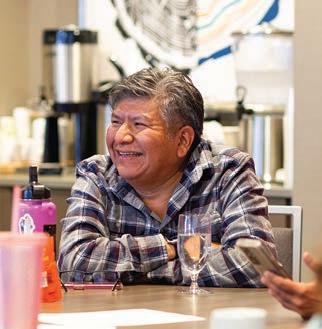
This annual report is © 2022 by the American Indian College Fund. All rights reserved.
Editor: Dina Horwedel
Copy editors: Colleen Billiot and Liana Epstein
Design and layout: ThinAirCreative, Inc.
Photo credits: American Indian College Fund, Nylana Murphy.
